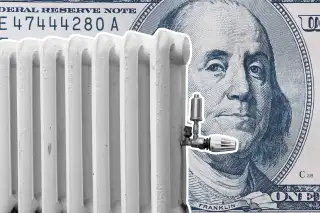'I Gasped': Abnormally High Heating Bills Are Outraging People Across the Country

Drivers have been fuming about high gas prices since last fall, and inflation has had Americans up in arms for almost a year now. But neither annoyance prepared people for the recent unpleasant shock of getting the winter's first gas and electric bills.
Soaring heating bills shouldn't come as a total surprise. Last fall, federal agencies warned that heating bills would surge 5% to 50% higher this winter, largely due to the rising costs of fuel. Inflation in general is now running at roughly 7.5% — a 40-year high — with energy prices up 27%, according to the Bureau of Labor Statistics.
But many Americans were caught off guard by heating bills that are outpacing inflation and are much higher than the forecasts anticipated.
"I literally think I gasped," one Minnesota resident said to a local CBS news station after seeing her $350 January heating bill. "I looked back to January [2021], and it was double what it was last year.”
Similar complaints are arising throughout the country.
In Wyoming, residents are reporting heating bills that jumped $100 or more compared to the same period a year ago. Energy officials in Iowa said residential gas bills went up by 106% in December. The natural gas supplier for much of Missouri, Mississippi and Alabama raised prices by 96% this year, and after an especially cold January, people there saw their bills rise by $50 to $150. It's essentially the same story for residents in places such as New Hampshire, Wisconsin, northern California, New York City and Ohio.
Even tropical Hawaii is being affected. Due to rising oil prices, the typical electric bill in the Aloha State is now running $180 versus around $140 last winter.
Why is my heating bill so high?
Power companies say they aren't to blame. They point to rising energy prices worldwide as the reason people are facing massive monthly bills.
"Natural gas prices have skyrocketed globally," Megan McFarland, a spokesperson for Pacific Gas & Electric, explained to an NBC station in California. "We’ve seen a 90% higher cost than last winter," she said, adding, "We’re not making any money off this situation."
Con Edison, which provides gas and electricity in the New York City area, recently sent customers an email stating that the combination of a spike in energy costs with a colder-than-usual January is what's responsible for soaring bills. "Con Edison buys energy on the wholesale market and provides it to customers at the same price we paid without a profit," the message said.
Brendan Conway, a spokesperson for We Energies, an energy supplier in Wisconsin, said recently that the high heating bills in the state should likewise be blamed on rising natural gas prices.
"There just wasn't enough natural gas that was produced during the coronavirus because there wasn't enough need," he said. "And then once that need increased so greatly in the past year or so there wasn't enough supply, so prices have gone up."
How to lower heating bills
When asked for advice on how people could lower their heating bills, Conway recommended some classic money-saving strategies like turning down your thermostat, putting on a sweater and opening the shades when it's sunny out.
"Let Mother Nature heat your house," he said.
High utility bills can be a particularly big problem for poorer Americans. Low-income households in the U.S. spend three times as much of their income on energy costs compared to the rest of the population, according to the Natural Resources Defense Council (NRDC), an environmental advocacy group.
Throughout the country, programs are available to help low-income residents pay their energy bills. If you suspect you qualify for financial assistance, go to Benefits.gov to find out about eligibility and who to contact in your area.
This year, some states are taking special steps to alleviate the pain of skyrocketing heating bills. In Maine, for example, there is a legislative proposal now on the table that would give a one-time credit of $90 to help low-income households with utility bills. Another proposal, in Illinois, would extend heating bill relief to middle-class households. Low-income residents in New Jersey are getting more federal assistance with winter heating bills this year, too.
If you don't qualify for relief with your heating bill, it's worth reaching out to your local provider to ask for help. Most have payment plan options available, and they may also offer good suggestions in general for saving energy and lowering your bills.
As for longer-term solutions, NRDC expert Laura Goldberg pointed out to Money that prices for electricity are much less volatile than they are for fossil fuels, which are always "at the mercy of unpredictable geopolitical and weather events."
Because retail electricity bills are usually based on a diversified and hedged portfolio of resources, their prices are much less likely to spike suddenly.
"We expect this trend to continue as U.S. households transition to cleaner electricity for space heating and water heating, reducing gas sales and making the gas infrastructure relatively more expensive for remaining gas customers," Goldberg said in an email to Money.
More from Money:
Your Heating Bill Will Skyrocket This Winter. Here's What to Do About It